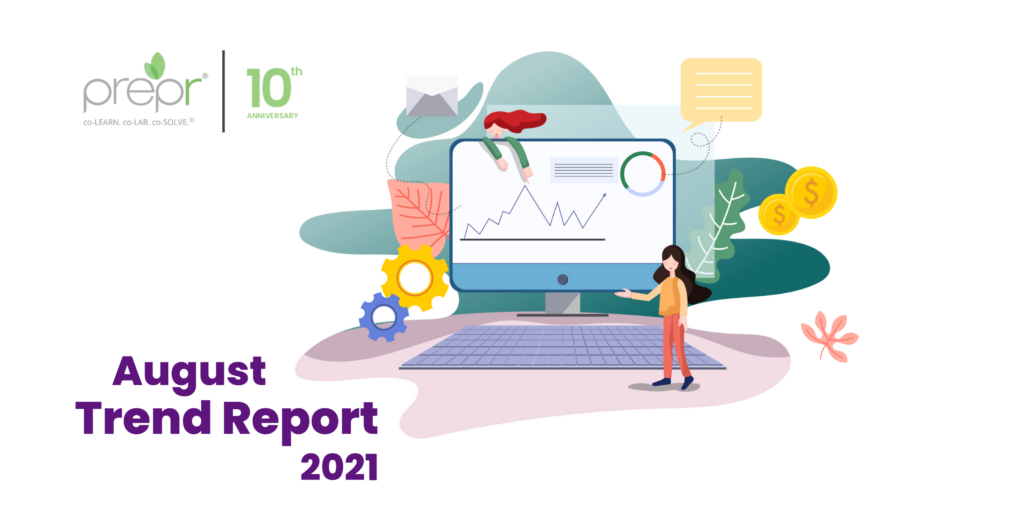As summer is coming to a close and the season slowly shifts to Fall, we continue to reflect on the unprecedented challenges we now face in the midst of a pandemic. Prepr is reflecting on new tech trends in some of the most affected sectors: healthcare, education, retail, manufacturing, and mobility.
Healthcare: Direct-to-Consumer Medical Machine Learning and AI
Cloud adoption is expanding and the medical industry is changing fast; according to the 2021 Healthcare Digital Transformation Survey report provided by BDO, approximately 78% of healthcare organizations have already incorporated cloud computing and another 20% of healthcare organizations plan to implement cloud computing sometime in the future. In addition, as healthcare continues to progress during the Covid-19 pandemic, direct-to-consumer medical artificial intelligence will continue to be implemented within the healthcare industry in order to help with diagnostic assessments and the increase in telemedicine.
Manufacturing: VR and AR for Touchless Service Models
The manufacturing sector has been hit hard by the pandemic. In order to adapt to the current changes and reduced person-to-person contact, the manufacturing industry is turning towards fully implementing augmented and virtual reality technology that will allow technicians to provide remote assistance. While factories have been dealt severe health precautions, the assistance of AI could change manufacturing forever!
Mobility: Augmented Reality in the Automotive Industry
Automotive experts predict that the future of mobility involves facial recognition technology within cars that will add a more personalized touch to the driving experience. For example, after the vehicle scans someone’s face and confirms their identity, the vehicle will automatically adjust the temperature, seating, and music based on their saved preferences.
Retail: VR and AR Shopping Experiences
Due to the pandemic, the retail industry has been hit hard. With limited capacity restrictions and constant disinfecting, many retail stores have implemented VR and AR technology to improve the consumer shopping experience. For example, instead of going into stores to shop for clothing, you can now do it online from the comfort of your own home with virtual fitting rooms. Want to see how a piece of furniture would look in your home? With AR applications, you can now see how it looks straight from your phone before making a purchase and spending the time to put it together.
Education: Artificial Intelligence in the Classroom
When it comes to education during a pandemic, educators have been on the lookout for innovative ways to deliver course material to students. For educators and students who are finding it challenging to adapt to the current situation of remote learning, AI programs have been getting developed to effectively deliver courses and accelerate students’ learning growth by adapting to their needs. For example, Fast ForWord is an adaptive reading and language program that uses AI technology to determine the root causes of reading difficulty to deliver lasting results that make better readers.
Food: High Demand for Functional Food
With the pandemic having lasted for over a year now, many people are starting to realize the impact their physical and mental health has on their immunity. In the process of looking for and making a habit of shopping for superfoods to boost their immune system, many people are integrating healthier foods into their daily diet. In a survey conducted by FMCG Gurus, approximately 80% of the survey participants stated that they want to eat and drink healthier in 2021 due to the pandemic.
Hospitality: Tourism, Virtual, and Augmented Reality
The hospitality and tourism industry is another area hit hard by the pandemic. As travelling options were limited and many places closed due to lockdown, many individuals had to develop a way to bring the experience to you through virtual and augmented reality. With a handy device like a smartphone, many consumers can now do virtual tours and easily pull up digital environments in order to explore places from around the world.
Environment: Reconnecting with Nature
With people often being told to stay indoors and with stores being closed, many individuals have begun to reconnect with nature through going on more frequent outdoor walks. As a result of reconnecting with nature, many people are becoming more aware of current environmental trends and more willing to protect nature.
Finance: Banking Goes Beyond Cash with Digital Engagement
In today’s current health climate, where contactless payment is preferred and sometimes required, this past year banks have relied heavily on apps in order to conduct business. Being able to track government benefits and easily access wages has been critical and so many banks have seen an increase in app downloads, where their clients are able to see all of their banking information wherever they are, digitally.
Energy: Renewables
Having access to energy is especially crucial during the pandemic; a current trend in this industry is the utilization of renewable energy that helps preserve the environment. As it produces zero harmful emissions, renewable energy is the pathway forward in terms of generating power at higher rates of efficiency.
Read more in our April Trend Report.
To find out how you can become an innovator in your industry, check out our Future Challenge initiative.

